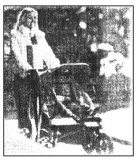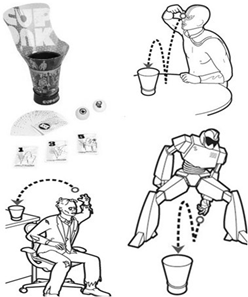题目内容
4.Do you want to have a close friend?Do you know how to make a good friend?Now,let me tell you.Before you make friends,you have to decide who you want to be your friends.Most people like to have friends who like to do the same kind of things they do.The quickest way to make a friend is to smile.When you smile,people think you are friendly and easy to talk to.It may not be easy at first to smile,but remember most people will stay away from a scared or angry looking face.
One easy way to start a conversation with someone is to say something nice about him.Think about how great you feel when someone says something nice to you.Doesn't it make you want to keep talking to that person?
Ask your new friends questions about themselves.Who's their favorite singer,where do they live,what do they do after school are all good questions to start a conversation.Make sure you have something to add to the conversation,too.When someone asks you a question,do have an answer for them.There's nothing that will stop a conversation quicker than a shrug (耸肩) for an answer.
Kids who show an interest in other kids and who are kind and friendly make good friends.Remember,everyone wants to be around people who like to do similar things and people who are nice to them.
66.What does the underlined word scared( in para.2)mean?B
A.holy B.frightening C.happy D.sad
67.The main idea isC.
A.how to start a conversation
B.how to praise a person
C.how to make friends
D.the importance of making friends
68.What kind of people are easy to become friends?D
A.who are happy every day.
B.who often speak ill of others.
C.who are good at communicating.
D.who share the same interest.
69.If a person shrug,what does he/she mean?B
A.being very proud B.making no answer
C.being very happy D.be humorous
70.Most people enjoy talking to oneA.
A.who speaks highly of them
B.who are very out-going.
C.who is always smiling
D.who points out their shortcomings.
分析 这篇文章讲的是如何交朋友,人们往往喜欢和有共同兴趣的人交朋友,对朋友微笑,多表扬朋友等.
解答 66.B 词义猜测题.根据第二段的stayaway from和angry looking face.可知是人们会远离令人害怕的和生气的脸.故选B.
67.C 主旨大意题.根据第一段的Do youwant to have a close friend?Do you know how to make a goodfriend?可知这篇文章讲的是如何交朋友.故选C.
68.D 细节理解题.根据第一段的Mostpeople like to have friends who like to do the same kind of things they do.可知有共同兴趣的人更有可能变成好朋友.故选D.
69.B 推理判断题.根据第四段的There'snothing that will stop a conversation quicker than a shrug (耸肩) foran answer.可知耸肩意味着不回答.故选B.
70.A 细节理解题.根据第二段的Oneeasy way to start a conversation with someone is to say something nice abouthim.可知人们喜欢对他们评价高的人.故选A.
点评 本文是科教类阅读,主要考查细节理解题和推理判断题.在做细节理解题时,首先根据题目要求迅速在文章里找出相应的段落、句子或短语.认真比较选项和文中细节的区别,在做推理判断题时不要以个人的主观想象代替文章的事实,要根据文章事实进行合乎逻辑的推理判断.

练习册系列答案
 全程金卷系列答案
全程金卷系列答案
相关题目
19.Many people complain that their memory is bad,particularly as they get older.Life would be so much easier if we could remember things (51)A.So how can we improve our memory?
Many people think that repeating things is the best way to remember.While this undoubtedly helps short-term memory (remembering a telephone number for a few seconds,(52)D,psychologists doubt whether it can help you to remember things for long.The British psychologist E.C.Stanford seemed to (53)Bthis point when he tested himself on five prayers that he had read aloud every morning for over 25 years.He found that he could remember no more than three words of them!(54)A,especially for remembering numbers,is‘chunking'(分块),or grouping the information.The following numbers would be (55)Bfor most of us to remember.1492178919931848.But look at them in‘chunks',and it becomes much easier.1492 1789 1993 1848.
So what about‘memory training'?We've all (56)Cpeople who can memorise packs of card by heart---how is this done and can anyone learn how to do it?(57)Cexperts,there are various ways of training your memory.Many of them (58)Dforming a mental picture of the items to be memorised.One method,which may be useful in learning foreign languages,is to create a picture in your mind (59)Da word you want to remember.Another method is to invent a story that includes all the things you want to remember.People were asked to remember up to 120 words using this technique; when tested afterwards,on average,they were able to (60)A90 per cent of them!Surprisingly,however,there is nothing (61)Dabout these methods---they were around even in ancient times.Apparently the Roman general Publius Scipio could (62)Bhis entire army---35,000 men in total!
(63)B,not all of us are interested in learning long lists of names and numbers just for fun.For those studying large quantities of information,psychologists suggest that the best way to‘form (64)Cconnections'is to ask yourself lots of questions as you go along.So,for example,if you were reading about a particular disease,you would ask yourself questions like:‘Do people get it from water?',‘What parts of the body does it affect?'and so on.This is said to be far more effective than time spent‘(65)A'reading and re-reading notes.
Many people think that repeating things is the best way to remember.While this undoubtedly helps short-term memory (remembering a telephone number for a few seconds,(52)D,psychologists doubt whether it can help you to remember things for long.The British psychologist E.C.Stanford seemed to (53)Bthis point when he tested himself on five prayers that he had read aloud every morning for over 25 years.He found that he could remember no more than three words of them!(54)A,especially for remembering numbers,is‘chunking'(分块),or grouping the information.The following numbers would be (55)Bfor most of us to remember.1492178919931848.But look at them in‘chunks',and it becomes much easier.1492 1789 1993 1848.
So what about‘memory training'?We've all (56)Cpeople who can memorise packs of card by heart---how is this done and can anyone learn how to do it?(57)Cexperts,there are various ways of training your memory.Many of them (58)Dforming a mental picture of the items to be memorised.One method,which may be useful in learning foreign languages,is to create a picture in your mind (59)Da word you want to remember.Another method is to invent a story that includes all the things you want to remember.People were asked to remember up to 120 words using this technique; when tested afterwards,on average,they were able to (60)A90 per cent of them!Surprisingly,however,there is nothing (61)Dabout these methods---they were around even in ancient times.Apparently the Roman general Publius Scipio could (62)Bhis entire army---35,000 men in total!
(63)B,not all of us are interested in learning long lists of names and numbers just for fun.For those studying large quantities of information,psychologists suggest that the best way to‘form (64)Cconnections'is to ask yourself lots of questions as you go along.So,for example,if you were reading about a particular disease,you would ask yourself questions like:‘Do people get it from water?',‘What parts of the body does it affect?'and so on.This is said to be far more effective than time spent‘(65)A'reading and re-reading notes.
| 51.A.effortlessly | B.purposefully | C.exactly | D.carelessly |
| 52.A.by contrast | B.in that case | C.in no way | D.for example |
| 53.A.raise | B.prove | C.discuss | D.stress |
| 54.A.More helpful | B.Much worse | C.More difficult | D.Much shorter |
| 55.A.convenient | B.impossible | C.meaningful | D.technical |
| 56.A.agreed with | B.learned from | C.heard about | D.apologized for |
| 57.A.Due to | B.In case of | C.According to | D.In spite of |
| 58.A.exclude | B.mean | C.suggest | D.involve |
| 59.A.isolated from | B.sensitive to | C.responsible for | D.associated with |
| 60.A.recall | B.recite | C.revise | D.restore |
| 61.A.effective | B.awful | C.valuable | D.new |
| 62.A.train | B.recognize | C.lead | D.command |
| 63.A.Furthermore | B.However | C.Summarily | D.Therefore |
| 64.A.unknown | B.loose | C.meaningful | D.personal |
| 65.A.passively | B.silently | C.amusingly | D.extensively. |
 Children pushed in buggies which face away from their parents may suffer longterm emotional(情感的)and language problems,according to a study published on Friday.
Children pushed in buggies which face away from their parents may suffer longterm emotional(情感的)and language problems,according to a study published on Friday. We all have our wish lists,whether it is for the holiday season,a birthday or a get-together.The fact is that we are all human and we all desire nice things and fun things.One thing that should not be missed is putting Cuponk on your wish list so that you can have years of fun and entertainment.
We all have our wish lists,whether it is for the holiday season,a birthday or a get-together.The fact is that we are all human and we all desire nice things and fun things.One thing that should not be missed is putting Cuponk on your wish list so that you can have years of fun and entertainment.